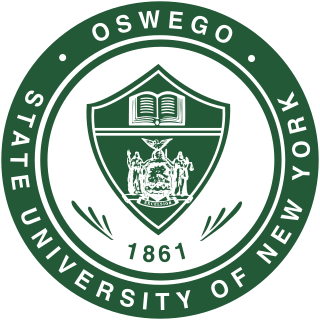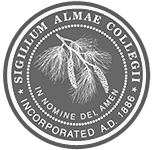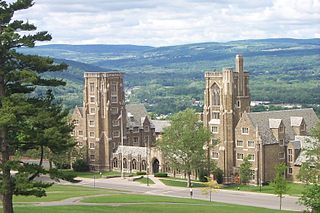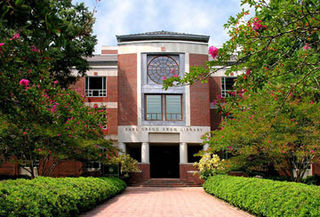The Phi Beta Kappa Society (ΦΒΚ) is the oldest academic honor society in the United States. It was founded at the College of William & Mary in Virginia, in December 1776. Phi Beta Kappa aims to promote and advocate excellence in the liberal arts and sciences, and to induct outstanding students of arts and sciences at select American colleges and universities. Since its inception, its inducted members include 17 United States presidents, 42 United States Supreme Court justices, and 136 Nobel laureates.

The College of William & Mary is a public research university in Williamsburg, Virginia, United States. Founded in 1693 under a royal charter issued by King William III and Queen Mary II, it is the second-oldest institution of higher education in the United States and the ninth-oldest in the English-speaking world. It is classified among "R2: Doctoral Universities – High Research Activity". In his 1985 book Public Ivies: A Guide to America's Best Public Undergraduate Colleges and Universities, Richard Moll included William & Mary as one of the original eight "Public Ivies". The university is among the original nine colonial colleges.

The University of Illinois Springfield (UIS) is a public university in Springfield, Illinois, United States. The university was established by the Illinois General Assembly in 1969 as Sangamon State University with a focus on post-graduate education. It became the third member of the University of Illinois system on July 1, 1995. The university serves 4,198 students as of fall 2022 with 56 bachelor's degrees, 39 minors, 44 master's degrees, one doctoral degree, 37 graduate certificates, and coursework that leads to six ISBE endorsements.

State University of New York at Oswego is a public university in Oswego, New York. It has a total student population of 6,756 and the campus size is 700 acres.

Emory & Henry University is a private university in Emory, Virginia, United States. The campus comprises 335 acres (1.36 km2) of Washington County, which is part of the Appalachian highlands of Southwest Virginia. Founded in 1836, Emory & Henry University is the oldest institution of higher learning in Southwest Virginia.

Alma College is a private Presbyterian liberal arts college in Alma, Michigan. It enrolls approximately 1,200 students and is accredited by the Higher Learning Commission. Alma College is affiliated with the Presbyterian Church (USA) and offers bachelor's degrees in multiple disciplines as well as four master's degree programs. Its athletics teams, nicknamed the Scots, are part of the National Collegiate Athletic Association (NCAA) – Division III and the Michigan Intercollegiate Athletic Association (MIAA).

Centre College, formally Centre College of Kentucky, is a private liberal arts college in Danville, Kentucky, United States. Chartered by the Kentucky General Assembly in 1819, the college is a member of the Associated Colleges of the South and the Association of Presbyterian Colleges and Universities. It has an enrollment of about 1,400 students.

Westminster College is a private college in Fulton, Missouri. It was established in 1851 as Fulton College. The school enrolled 609 students in 2020. America's National Churchill Museum is a historic site located on campus.

Kaplan Arena is a building used for athletic events for the William & Mary Tribe sports teams at the College of William & Mary in Williamsburg, Virginia. The building contains an 8,600-seat arena, which can seat 11,300 with extra bleachers. The arena's floor measures almost 24,000 square feet (2,200 m2). The building was formerly known as William & Mary Hall. From 2005 to 2016, only the arena proper was called Kaplan Arena, before the entire building was renamed to honor alumni Jane Thompson Kaplan and Jim Kaplan.

Mount Saint Mary College is a private Catholic college in Newburgh, New York. It was founded in 1959 by the Dominican Sisters.

West Campus is a residential section of Cornell University main campus in Ithaca, New York. It is bounded roughly by Fall Creek gorge to the north, West Avenue and Libe Slope to the east, Cascadilla gorge and the Ithaca City Cemetery to the south, and University Avenue and Lake Street to the west. It now primarily houses transfer students, second year students, and upperclassmen.

The Earl Gregg Swem Library is located on Landrum Drive at the College of William and Mary in Williamsburg, Virginia. The library is named for Earl Gregg Swem, College Librarian from 1920-1944. In 2008, the Princeton Review rated William & Mary's library system as the eighth best in the United States. The ranking was based on a survey of 120,000 students from 368 campuses nationwide.

The Alumni House, formerly known as the Bright House, is a 19th-century building located on the College of William & Mary's campus in the middle of historic Williamsburg, Virginia. The home was originally situated on a farm called "New Hope" owned by Samuel Bright and his family and at that time on the outskirts of the town.
The North American fraternity and sorority system began with students who wanted to meet secretly, usually for discussions and debates not thought appropriate by the faculty of their schools. Today they are used as social, professional, and honorary groups that promote varied combinations of community service, leadership, and academic achievement.

Julian Alvin Carroll Chandler, usually cited as J. A. C. Chandler, was an American historian, author and educator. He is best known as the 18th president of The College of William and Mary in Williamsburg, Virginia, where he served as the successor to retiring fellow educator and author Lyon Gardiner Tyler. Dr. Chandler is credited with transforming the institution from a small, struggling liberal arts college for men into a modern coeducational institution of higher learning.

The Gentlemen of the College is a Tenor/Bass singing group, and the oldest Tenor/Bass a cappella group at the College of William & Mary. Founded in 1990 the Gentlemen started out as a men's choir that concentrated in barbershop and traditional pieces—a repertoire that has since evolved to encompass a large selection of contemporary music. Known for their navy blazers, khaki pants, and novelty ties, the Gentlemen perform at the collegiate, local, and national level. The Gentlemen usually field four 'fixed' concerts per year—a Homecoming concert in the Sadler Center, Two "Wren 10"s on the portico of the Wren Building, and a final concert in Phi Beta Kappa Memorial Hall Additionally, the Gentlemen have performed on national television, at The White House, The Capitol the Waldorf Astoria, and for Queen Elizabeth II of the United Kingdom. The Gentlemen have 21 studio CDs in their discography, having just released their most recent album, YuleTied, in 2023.
The 1976 United States presidential debates were a series of debates held during the 1976 presidential election.

The College of William & Mary has maintained a campus in what is now Williamsburg, Virginia, since 1693. The cornerstone of the Wren Building, then known as the College Building and the oldest surviving academic building in the United States, was laid in 1695. The college's 18th-century campus includes the College Building, the President's House, and Brafferton–all of which were constructed using slave labor. These buildings were altered and damaged during the succeeding centuries before receiving significant restorations by the Colonial Williamsburg program during the 1920s and 1930s.

Ewell Hall is an academic building on the campus of the College of William & Mary in Williamsburg, Virginia. The building was constructed in 1925–1926 on what is now Old Campus, across from Tucker Hall on the Sunken Garden. It was originally named Phi Beta Kappa Memorial Hall for Phi Beta Kappa, an honor society founded at the College of William & Mary and the oldest such society in the United States. John D. Rockefeller Jr. attended the hall's 1926 dedication; during this visit, W. A. R. Goodwin convinced Rockefeller to participate in a restoration program that became Colonial Williamsburg.


















